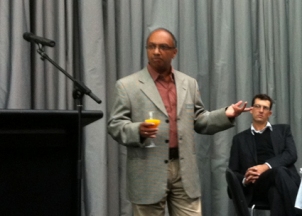
AUCKLAND (Pacific Scoop/ Pacific Media Watch): A communication for social change educator has called for more “bottom up” initiatives as a critical step for more effective development.
“Don’t adopt the ‘top down’ process and bulldoze your way,” associate professor Pradip Thomas, co-director of the University of Queensland’s Centre for Communication and Social Change, told an Auckland breakfast seminar hosted by Unitec.
He said it was about helping developing countries to become self-sustaining.
“We never want them to become dependent on aid,” he said.
Citing some key points from the 2009 book Communication for another development: listening before telling, Dr Pradip said social change could only occur when the cultural context was understood and solutions were discussed rather than imposed.
He emphasised the importance of listening when working with developing countries.
“A sustainable social change process has to be based on effective partnership,” he said.
Dr Thomas said that above all else “communication is about relationships”.
There needed to be respect for tradition and for tried and true ways of doing things.
Discounting the old
“Unfortunately we have reached an age where we are discounting the old, its all about the new…we need to find a balance,” he said.
Dr Thomas used the example of community radio, saying it still had a huge capacity to reach people and be an effective method of communication.
For social change to occur in developing countries, organisations and governments needed to “intentionally engage with communities from the very beginning”.
Head of communications at Unitec Dr Jocelyn Williams said communication being used to bring about social change was a “rising tide”.
“Pradip is a pioneer” in the field of effective communication to create social change, she added.
Unitec postgraduate programme leader Dr Philip Cass said many of the points raised in the seminar should be applied to the Pacific Islands.
Imposed agendas
“Too often development agendas are imposed from above and they don’t serve the needs of the people.
“That’s why you wind up with donors giving computers and printers to villages where there is no reliable electricity system,” he said.
Dr Cass said bureaucracy could hinder development in the Pacific.
“NGOs can sometimes become an obstacle to development by becoming too institutionalised and too focused on funding and playing the development game rather than concentrating on the needs of ordinary people,” he said.
Dr Cass said that while understanding culture and tradition were an essential part of seeing development in the Pacific, they could be used as excuses to block change.
“It is difficult for the media to affect major social change if it is repressed. Culture and tradition can be marvelous excuse for inertia,” he said.
Dr Cass said the Pacific was facing many issues, which need to be addressed.
“The challenges are enormous – chronic political instability in Fiji, corruption, violence, drugs, AIDS and environmental damage in PNG, deforestation and violence in the Solomon Islands and broader questions of political accountability and democracy throughout Polynesia, Melanesia and Micronesia,” he said.
Dr Cass said that many Pacific Islanders were disheartened.
“The promise and optimism of independence has, to a large extent, faded in many of the Pacific nations and they have found themselves beset by internal turmoil,” he said.
These issues needed to be approached in a new way.
“There needs to be a new partnership between Western governments and NGOs and international bodies with the people of the Islands. There needs to be patience, goodwill and a genuine desire on all sides to assess what needs to be done,” he said.
This work is licensed under a Creative Commons Attribution-NonCommercial 3.0 New Zealand Licence.




